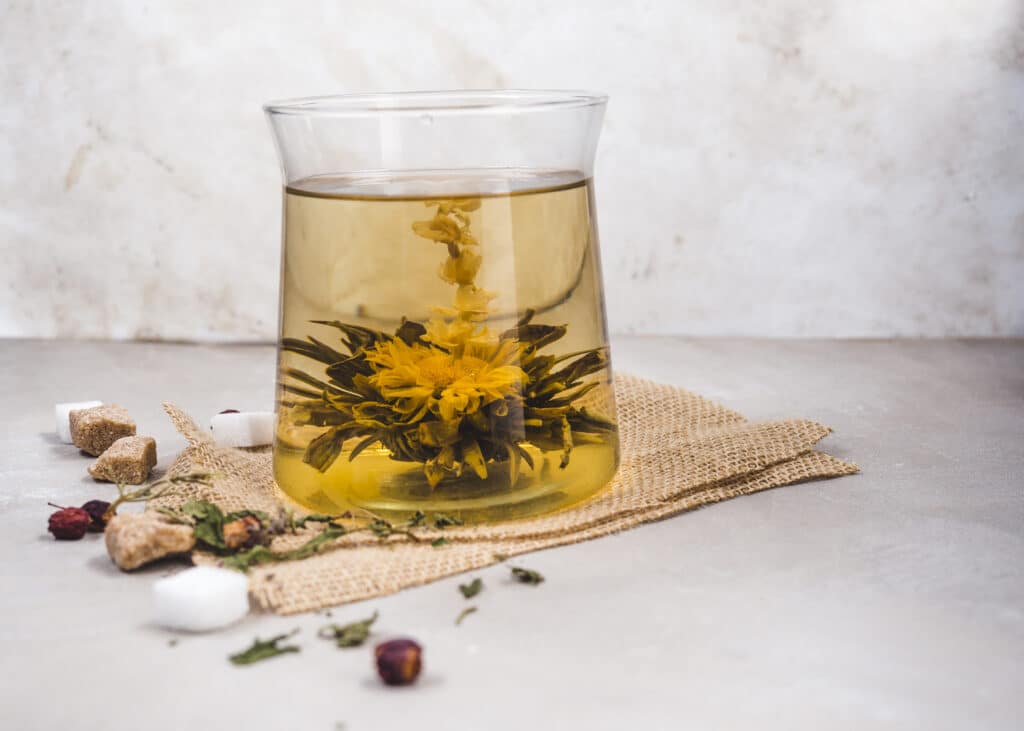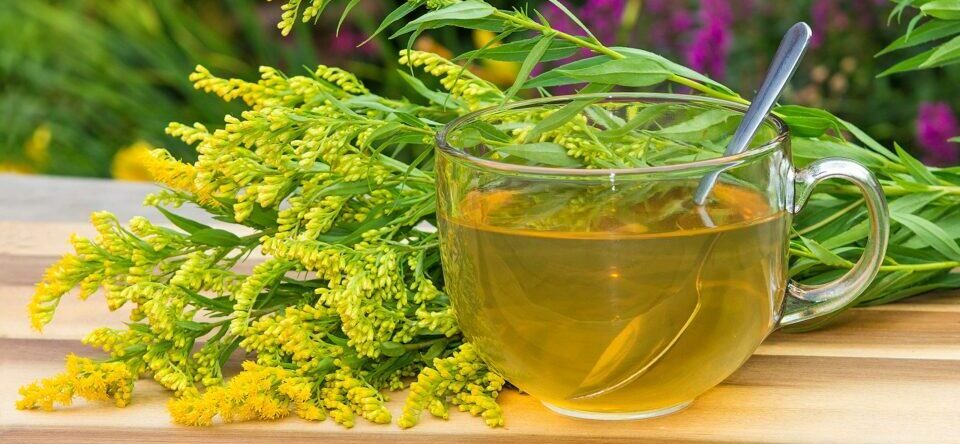Goldenrod Tea: Benefits For Health | Brewing Methods
Goldenrod tea is a drink that’s good for your health. It comes from the goldenrod plant, which is bright and tall with yellow flowers. Long ago, people used it to help heal skin hurts and improve their pee flow when sick.
This tea has special stuff that fights swelling and germs, making it great for sore throats and keeping your bladder healthy.
Drinking goldenrod tea might also help you feel less puffy by removing extra water. You can make this tea differently, but you should usually have 2 to 4 cups daily.
Keep the tea in a tight jar away from light to stay fresh.
Be careful if you have allergies or take water pills because goldenrod could bother you or not mix well with your medicine. Let’s explore how this sunny-looking herb can become a helpful cup of tea!
Key Takeaways

-
- Goldenrod tea may help with swelling and urinary health. It can also fight fungus and protect cells.
-
- You can make goldenrod tea by steeping, boiling, or making a tincture. Drink 2 – 4 cups per day for the best results.
-
- Keep goldenrod tea in a cool, dark place in an airtight container to keep it good.
-
- If you are allergic to ragweed or taking medicine, talk to a doctor before trying goldenrod tea.
-
- Too much goldenrod tea might cause heartburn or not work well with some drugs.
What is Goldenrod?
Goldenrod is a flowering plant with bright yellow flowers that belongs to the Solidago genus. It can be found in North America, Europe, and Asia. Traditionally, herbal medicine has used goldenrod to support urinary tract health and its anti-inflammatory properties.
The plant has long stems with lance-shaped leaves and is a vibrant addition to any landscape.
The traditional uses of goldenrods have increased interest in their potential health benefits when consumed as a tea. Let’s explore the advantages of incorporating goldenrod tea into your daily routine!
Description and Appearance
Goldenrod stands tall and proud with its bright yellow clusters of flowers. This plant paints fields and meadows in vivid hues of gold during late summer and fall. Its long, thin stems hold the narrow, lance-shaped leaves while the small blooms combine to make a showy display.
You’ll know goldenrod by its sweet, earthy scent that fills the air around it.
When you make tea from this herb, the water turns a rich shade of gold. Sipping on goldenrod tea is like drinking in the sunshine, even though it might taste slightly bitter initially. The deep color signifies its strong herbal qualities.
People looking for natural ways to boost their health often turn to Goldenrod for both its beauty and what’s believed to be healing power hidden within those vibrant flowers and leaves.
Traditional uses in herbal medicine
People have been using goldenrod for a long time to help their bodies heal. They would make tea or mix it into foods to soothe pain and swelling. This plant was popular for its power to ease problems with peeing, like infections or stones in the kidney.
Herbalists saw how it could make wounds better and stop bleeding, too. The flowers were not just pretty; they helped folks deal with many body troubles.
In places like Russia, this special herb had a big name for helping blood stop flowing from cuts and keeping skin tight and strong. It also fought tiny bugs that cause sickness. For years, people trusted Goldenrod to fix many health woes because of its tough fighting powers against germs and swelling inside the body.
Health Benefits of Goldenrod Tea

Goldenrod tea may offer various health benefits, including potential anti-inflammatory properties and support for urinary system health. Some studies also suggest that goldenrod tea may have antioxidant and diuretic effects, making it a popular choice for those looking to improve their overall well-being.
Whether you suffer from arthritis or urinary tract infections, goldenrod tea could be worth considering as part of your natural health regimen.
May reduce inflammation
Drinking goldenrod tea might help calm swelling in the body. This is good news for people with arthritis or sore muscles. Studies show that things inside goldenrod can decrease inflammation.
When you put it on your skin, it may ease pain and puffiness, too.
If you have health problems like high blood pressure, this tea could be a natural way to get help. But remember not to use too much without talking to an expert first. The right amount of tea can support your body in dealing with inflammation the right way.
Supports urinary system health
Goldenrod tea has traditionally been used to support urinary system health, easing symptoms of urinary tract infections and reducing inflammation. Its diuretic properties help flush out impurities and eliminate excess water from the body.
Additionally, goldenrod’s astringent properties tone the tissues of the urinary tract and assist with relieving painful spasms.
Overall, goldenrod tea offers natural support for maintaining a healthy urinary system by addressing issues such as UTIs, inflammation, and fluid balance within the body.
Other possible benefits
Goldenrod tea may also have antifungal properties, which could help combat certain fungal infections. Some studies suggest that goldenrod extract may protect your cells from damage due to its antioxidant properties.
Consuming goldenrod tea might aid in improving skin health by reducing inflammation and supporting overall cellular function. Additionally, some people have reported experiencing relief from seasonal allergies after consuming goldenrod tea.
Furthermore, goldenrod is used traditionally as a diaphoretic, which helps the body lose too much water when needed while maintaining fluid balance during illness.
Forms and Dosage of Goldenrod Tea
When preparing goldenrod tea, several brewing methods can be used to make the most out of this herbal remedy. From using dried goldenrod leaves to creating a goldenrod tincture, each form has its unique benefits.
Additionally, understanding the recommended dosage and how to store goldenrod tea properly is essential for maximizing its health benefits.
Different brewing methods
Goldenrod tea can be brewed using different methods, offering various ways to enjoy its benefits. Below are the detailed brewing methods:
- Steeping: This method involves pouring hot water over dried goldenrod leaves and allowing them to steep for 5-10 minutes. The resulting infusion can be enjoyed as a warm or chilled tea.
- Boiling: To make goldenrod tea using boiling water, add dried goldenrod leaves to a pot of boiling water and let it simmer for 10-15 minutes. Afterward, strain the mixture and serve the tea.
- Tincture: Making a goldenrod tea tincture involves soaking dried goldenrod in alcohol for several weeks to extract its beneficial compounds. The resulting tincture can be added to water or other beverages for consumption.
Recommended dosage
Regarding goldenrod tea, the recommended dosage ranges from 6-12 grams per day. This is equivalent to enjoying 2-4 cups of this herbal brew daily. It’s best to consume goldenrod tea between meals for optimal benefits, making it a simple addition to your daily health routine.
For those looking for a natural way to support their health, incorporating goldenrod tea at the suggested dosage into their daily regimen may offer potential benefits.
How to store goldenrod tea
To store goldenrod tea, you need an airtight container. Keep it in a cool, dark place to maintain its freshness and strength. Avoid direct sunlight and heat as they can diminish its beneficial properties.
Storing your goldenrod tea properly will help preserve its potency so you can enjoy its long-term health benefits.
Goldenrod tea is best kept in an airtight container away from light and heat to maintain its beneficial properties over time. Remember to keep the container in a cool, dark place like a pantry or cupboard to preserve the freshness of your goldenrod tea.
Precautions and Interactions
Please be aware that goldenrod may cause allergic reactions in people sensitive to related plants, such as ragweed. It is important to consult with a healthcare professional before using Goldenrod, especially if you have certain health conditions or are taking other medications.
To learn more about the potential precautions and interactions of goldenrod, continue reading below.
Allergies and medical conditions to consider
-
- Some people may be allergic to goldenrod and should avoid using it if they have allergies to ragweed and related plants.
-
- If you have a history of skin rashes, asthma, or other allergic reactions, consult your healthcare provider before using Goldenrod.
-
- Goldenrod can cause potential side effects and interactions for individuals with certain health conditions or taking specific medications.
-
- People with known allergies should be cautious when using herbal supplements like Goldenrod to avoid adverse reactions.
-
- It’s important to consider any existing medical conditions and consult a healthcare professional before incorporating Goldenrod into your wellness routine.
Potential side effects and interactions
Goldenrod tea may cause heartburn in some people, especially those with certain health issues. It is important to note potential interactions between goldenrod and conventional medications, as they could lead to negative effects. Taking Goldenrod with diuretic medications may result in dehydration. Additionally, goldenrod may interact negatively with other drugs, including “water pills.”
FAQs
1. What is goldenrod tea good for?
Goldenrod tea has many health benefits, like helping with inflammation and pain and increasing urine flow for bladder health, and it might work as an anti-inflammatory.
2. Can drinking goldenrod tea cause allergies?
Yes, since goldenrod comes from the same family that includes ragweed, it may cause an allergic reaction in people who are sensitive to pollen.
3. How do you make goldenrod tea?
You make the whole dried herb of European Goldenrod into a hot drink by brewing it just like you would with green tea.
4. Is goldenrod safe to use every day?
People should learn more about Goldenrod and talk to a doctor about the appropriate dose before using it often or trying products containing it.
5. What does science say about the benefits of goldenrod?
A study found that goldenrod contains chemicals like saponin and flavonoid, which have anti-inflammatory effects and other helpful qualities for your health.
6. How does taking Goldenrod help with urinary problems?
Goldenrods help open up passages in your body and work best if taken with lots of fluids; this can help keep your bladder healthy by making you pee more.

